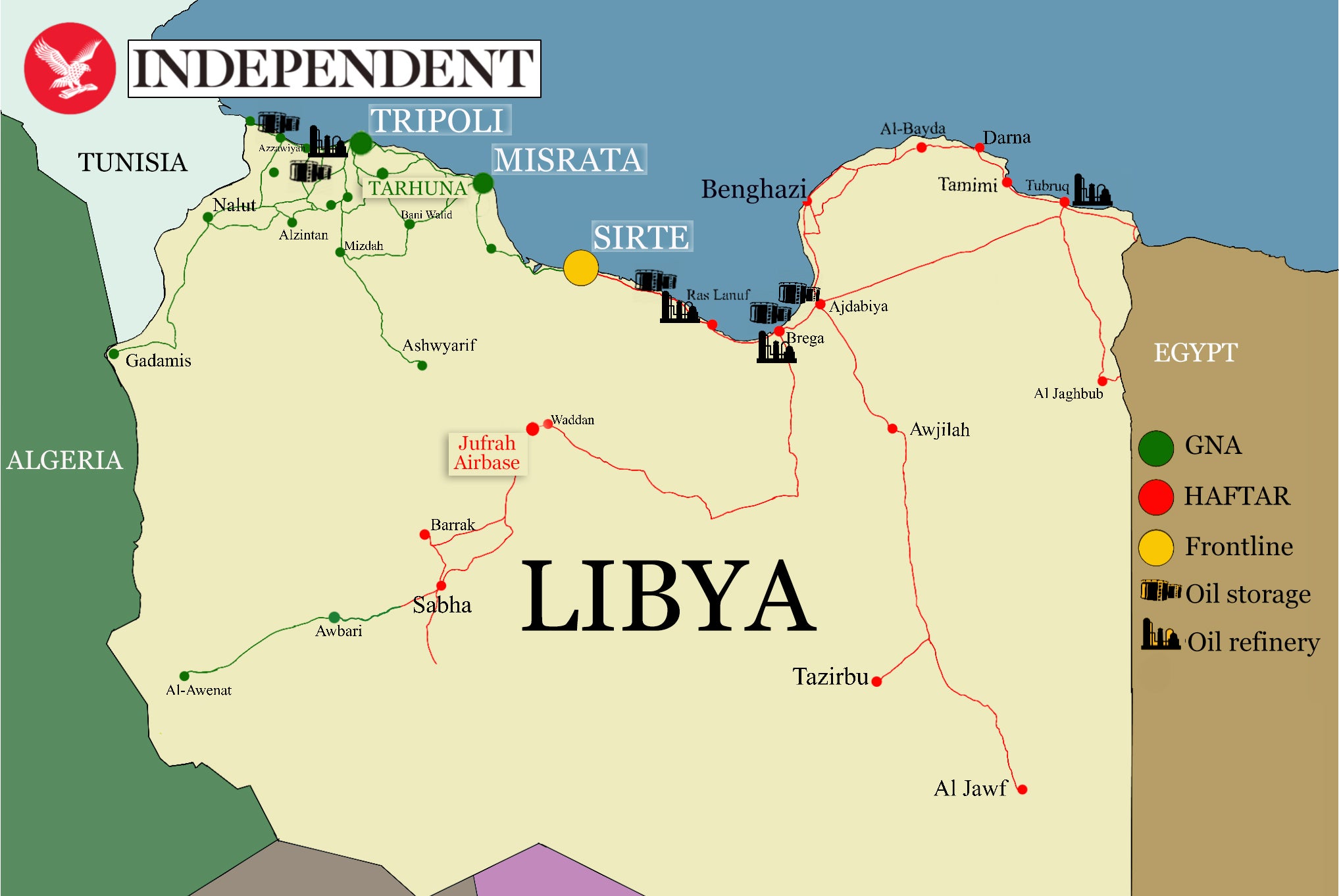The rumours quickly spread among the Syrian fighters in Libya. A group of mercenaries recently hired by the internationally recognised Libyan government were in hospital with serious chest infections.
Panic rippled through the ranks that it was the deadly coronavirus. No measures had been taken when they started their long trip from northern Syria via Turkey to Tripoli. No one had self-isolated, worn a mask or had a test.
“We tried to find out more information but couldn’t,” said one fighter, among an estimated 6000 Syrians employed to support the Turkey-backed Libya’s recognised Government of National Accord (GNA).
He said his commanders were tightlipped about the incident. The GNA denied the rumours in a statement to The Independent. Instead its officials have blamed their foes- the forces of renegade general Khalifa Haftar – of spreading Covid-19 through their own foreign mercenaries.
“There are no precautions taken here for fighters, it’s like coronavirus doesn’t exist,” the fighter lamented.
Wars have ravaged healthcare systems across the Middle East and North Africa leaving several countries extremely susceptible to outbreaks of Covid-19. But world health officials are now concerned about a new secret spreader of the disease: combatants.
Over the past few months, as the pandemic swept across the globe, swathes of soldiers, fighters and mercenaries from countries like Syria, Turkey, Iran and Iraq have deployed to frontlines across the region, despite the fact their cross-border travels break international lockdowns and travel restrictions.
Little to no care has been taken to mitigate this potentially devastating transmission of the disease even though many of these countries are among the most vulnerable to the pandemic. The secretive nature of their movement makes contact tracing impossible.
WHO and other United Nations officials have all sounded the alarm, telling The Independent with so little information and testing, there is no way to accurately measure what damage might have been done. They say local efforts to stamp out the disease will be undermined by the continued international movement of troops, prolonging and deepening existing outbreaks or even creating new clusters.
“Clearly you want to control public health measures at border crossings, airports and ports. Ideally, you would be screening people and enforcing quarantines,” said Richard Brennan, acting Regional Emergency Director for WHO’s regional office.Top ArticlesMan shot by armed police as Glasgow city centre shut down ‑follow live




 READ MORESKIP AD
READ MORESKIP AD
No hype, just the advice and analysis you needContinue
“There is already little capacity to do that in many places like Libya. Now there are armed groups coming in, without screening, no quarantining and no tracking in the country, this is exactly the kind of the way the disease can spread unchecked.”
He said it was a region-wide problem made worse by the fact combatants then moved around the countries they had travelled to.
This is coming to a head in Libya that has morphed into the world’s newest proxy war with a huge influx of combatants into the country despite worldwide coronavirus lockdowns.

UN investigators, sources across Libya and Syria as well as the fighters themselves, estimate well over 10,000 Syrians fighters have travelled to fight on both sides of Libya’s conflict since January. That deployment accelerated through the spring just as Covid-19 gripped the world.
Thousands of Syrians from opposition areas sent to fight for the GNA have transited through Turkey that, with over 190,000 confirmed Covid-19 cases and more than 5000 deaths, is suffering from one of the worst outbreaks in the region. A new brigade of Syrian fighters reportedly arrived just last week according to sources in Syria and Libya.
UN investigators, meanwhile, say at least 2000 Syrians from pro-regime areas have been hired via Russian companies to fight for the GNA’s rivals: renegade general Khalifa Haftar in the east of the country. The Independent was able to track a surge in recruitment of Syrian mercenaries to General Haftar’s ranks as late as mid-May in the middle of the pandemic. Forces allegedly continue to be recruited this week.
On Wednesday, Libya’s National Centre for Disease Control announced its biggest daily increase yet in coronavirus infections and deaths. There are now a total of 698 and 18 fatalities across the country.
But without proper contact tracing and tests, it is impossible to confirm the true rate of the outbreak in Libya or whether there is a link between the flood of foreign troops and the spike in cases.
There is already little capacity to do that in many places like Libya. Now there are armed groups coming in, without screening, no quarantining and no tracking in the country, this is exactly the kind of the way the disease can spread unchecked
Richard Brennan, WHO Emergency Director
However, UN officials have warned the cross-border movement of combatants poses a substantial risk for the country where hospitals have been bombed, and there are shortages of personal protective equipment, ventilators and Covid-19 tests.
“Our view is that Libya has not reached the peak of the threat of the coronavirus. There’s not enough testing. There is minimal containment. Yet there are continuing flights into Libya,” Stephanie Williams, deputy chief of the UN’s support mission in Libya (Unsmil) told The Independent.
“As both parties [in the war] are flying in fighters into Libya, there’s no transparency on the preventive measures in this scenario. Are they being quarantined before they’re being sent to the front lines?” she asked.
Health officials have expressed similar concerns about foreign troops travelling to fight in other parts of the region, including within Syria‘s own deeply complex civil war.
Turkey has deployed troops to opposition-held areas of Syria since 2016 to back rebels against President Bashar al-Assad, who is supported by Iran, Russia and Iranian-backed paramilitary groups from Lebanon and Iraq.
Thousands of Turkish troops, police, municipal officials, and employees of the government and charities cross in and out of Syria every day. Rahmi Doğan, the governor of the southern province of Hatay, admitted at the start of the month 140 soldiers and police officers working in the opposition-held Syrian cities of Afrin and Idlib, had contracted the coronavirus.
The news, reported in both Turkish and Syrian media, has sparked panic among Syrian residents and fighters in the Idlib and Western Aleppo area, where there is a woeful lack of personal protective equipment, ventilators and just one testing machine for the four million people who live there. Many civilians are displaced from other parts of Syria and so live in overcrowded, unhygienic camps leaving them particularly vulnerable to the disease.
The Turkish authorities have maintained they immediately isolated and evacuated those in northern Syria who contracted the coronavirus and promised to minimise its troop movement in the operation zone.
But within the war-ravaged area, Syrian residents say vulnerable families have no access to healthcare and so are keeping their distance from Turkish soldiers.
“We are afraid of transmission of Covid-19, the virus can only have come to the north of Syria when the Turkish units switch shifts. There were cases detected in Afrin and Mastuma camp,” said Mohamed Abdullah, one Syrian rebel.

Meanwhile in regime-held areas of Deir Ezzor to the east, there have been multiple unconfirmed reports about outbreaks of Covid-19 among forces that hail from Iran and Iraq, two countries that are currently struggling to stamp out huge outbreaks.
Daniel Al-Furati, who is from Deir Ezzor said over the last few months crossings with Iraq “remain entirely open” for Iranian and Iraqi militiamen who are fighting on the side of the Syrian regime.
“Those groups came into contact with the local pro-government brigades. They are infected and transmit the coronavirus to the population there,” he said.
Deir Ezzor 24, a local activist collective, also reported this phenomenon. They accused Assad’s forces of enforcing a “media blackout” on the origins of Covid-19 infections there.
Without testing it is again impossible to confirm. The Syrian regime has denied outbreaks in the eastern border area.
Far from addressing public health concerns of combatants flowing in and out of warzones during the pandemic, belligerents are trading accusations over the spreading of the coronavirus.
Libyan health officials in Tripoli, have repeatedly accused their chief foe, Haftar’s Libyan Arab Armed Forces (LAAF) of spreading the virus through its use of mercenaries, which according to the United States Africa Command and UN investigators include 2000 Russians, 2000 Syrians and 2000 Sudanese.
GNA health ministry spokesperson Ameen Al-Hashimi told The Independent that the authorities had been anxiously following dozens of flights allegedly carrying Syrian and possibly Russian mercenaries from Syria to east Libya this year.
“When we contacted the health authorities in the east they said that their troops were not subject to any health analyses or quarantines and were sent directly to the frontlines in west Libya, which poses a danger to citizens,“ Mr Hashimi told The Independent.
He said sources in the east had also told them several foreign nationals including Russians and Syrians had been isolated over the last few months with Covid-19 symptoms.
The LAAF, which vehemently denies having foreign fighters among its ranks, threw similar accusations at the GNA saying it was “ironic” that the Tripoli government was complaining about the coronavirus.
“We are worried about the virus among the Syrian mercenaries the GNA has deployed,” one LAAF spokesman told The Independent. He said that they had received reports of at least 17 Syrian mercenaries being hospitalised with the virus two months ago, echoing rumours The Independent had also been told.
The tidal surge of forces has not abated. Sources in northern Syria told The Independent that hundreds of Syrian fighters had crossed into Turkey ready to deploy to Tripoli for the GNA in the coming days – despite a recent surge in Coronavirus in Turkey over the last few weeks.
Syrian fighters already in Libya said there was regular back and forth between the two countries as brigades were sent home and fresh recruits were brought over in a kind of “changing of the guard”. This was also reported by the Syrian Observatory for Human Rights who claimed as many 1,800 have arrived in Turkey to undergo military training ready to fly to Libya while 2,600 have returned to Syria from Libya this month alone.
“No one cares about coronavirus here. We had no lockdown, no measures in place, no masks, no testing, no hand sanitisers. It’s like it didn’t happen,” said one Syrian mercenary in West Libya.
While anyone can spread coronavirus, Covid-19 symptoms tend to most badly afflict the elderly and the infirm, while mostly sparing the young athletic men in their 20s and 30s who make up the bulk of warriors in combat zones.
Another asked about coronavirus measures, was sanguine.
“It isn’t something we are thinking about,” he said. “We are more worried about being shot.”


